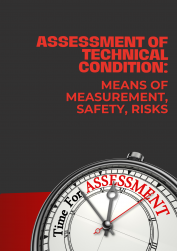Analysis of the temperature effect on the stress-strain state of the tank car boiler during steaming
Keywords:
Transport mechanics, railway transport, temperature influence, stress-strain state, freight cars, running tests, dynamic processes, stability, load-bearing systems, promising structures, fire resistance, limit state, loss of integrity, tabular method, simplified method, refined methodAbstract
Uninterrupted transportation of bulk fuel and lubricant cargoes is one of the main tasks facing the railway transport of Ukraine. At the same time, the nomenclature (light and dark petroleum products, fuel oils) of bulk cargoes and the limited number (due to the obsolescence of the existing fleet of tank cars and the inability to renew them in military conditions) of the corresponding rolling stock require constant and high-quality cleaning of tank car boilers. This is due to the need for prompt use of tank cars for the transportation of various types of cargo. Modern boiler cleaning technologies are associated with the application of temperature loads to their boilers, namely with washing and steaming operations. This directly affects the stress-deformed state of tank car boilers. Which, in turn, determines the need for scientific research to determine the temperature effect on the stressed-deformed state of the tank car boiler during washing and steaming operations. It was the solution of such a scientific and applied task that became the goal of research, the results of which are presented in this section of the monograph.
To achieve the set goal, the following scientific and applied tasks were defined and solved. The existing information sources on the relevant topic were analyzed. Next, the technical description and requirements for modern designs of tank cars and their boilers are presented. Then, the used and adapted moment theory of shells is presented. On the basis of this mathematical theory, the load values at the control points of the tank car boiler are determined. Based on these results, the calculation model built in a modern computer computing and software complex was adjusted. Which was calculated using the finite element method and brought to an adequate level. The developed adequate finite element model includes the optimal number of finite elements and nodes: 10 182 768 elements and 18 655 084 nodes. Tetrahedrons and triangles are used as finite elements. With the use of the developed adequate finite-element model, temperature load calculations and simulation of the application of hot steam were carried out. At the same time, the temperature of hot steam is 160 °C, and the calculation period is 20 minutes. As a result of the calculations, it was found that the maximum heating temperature of the boiler is 71.3 °C when the temperature is loaded with steam. On the basis of the obtained results of temperature simulations, the input data for determining the stress-strain state of the tank car boiler were formed. The results of the calculations made it possible to establish that the maximum stress values are 173 MPa and do not exceed the permissible values. That is, when washing and steaming operations are carried out, the strength condition is fulfilled.
The obtained results of simulations of temperature loads and the stress-strain states corresponding to them will be useful in conducting further research and development works on the selected topic. In addition, the obtained results and achievements can be used in educational activities in the preparation of students of various levels of education.

ASSESSMENT OF TECHNICAL CONDITION: MEANS OF MEASUREMENT, SAFETY, RISKS
Downloads
Pages
Published
Categories
License

This work is licensed under a Creative Commons Attribution-NonCommercial-NoDerivatives 4.0 International License.

